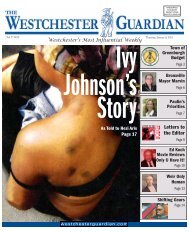Westchester County Executive Rob Astorino Fooled Us ... - Typepad
Westchester County Executive Rob Astorino Fooled Us ... - Typepad
Westchester County Executive Rob Astorino Fooled Us ... - Typepad
Create successful ePaper yourself
Turn your PDF publications into a flip-book with our unique Google optimized e-Paper software.
THE WESTCHESTER GUARDIAN THURSDAY, MAY 26, 2011<br />
PAGE 9<br />
TRUTH AND JUSTICE<br />
Harmless Error: Is It Ever Really Harmless?<br />
By JEFF DESKOVIC<br />
“The Constitution entitles<br />
a criminal defendant to a fair<br />
trial, not a perfect one.”<br />
The above quote penned<br />
by Thomas Jefferson in a<br />
letter to James Madison from Paris on<br />
December 20, 1787 may have partially<br />
inspired Madison’s response the following<br />
year. Madison in Letter 51 of the Federalist<br />
Papers declared: Justice is the end (purpose)<br />
of government. It is the end of civil society. It<br />
ever has been, and will ever be pursued until it<br />
is obtained, or until liberty be lost in the pursuit.<br />
Today the debate continues, certainly<br />
in our state and federal appellate tribunals.<br />
The expression harmless error is frequently<br />
employed in the rulings of the New York<br />
State Supreme Court Appellate Division<br />
when confronted with an appeal from<br />
a criminal defendant alleging wrongful<br />
action, or mishandling by a court below<br />
believed to have negatively influenced the<br />
outcome of his case. The concept is meant<br />
to suggest that although the petitioner may<br />
be factually correct in his assertion that the<br />
trial court in some specific manner improperly<br />
dealt with his case, nevertheless, no<br />
harm was done, the outcome would have<br />
been the same had it not. And, therefore, no<br />
harm, no foul.<br />
Unfortunately, all too often, appellate<br />
panels are in no good position to accurately<br />
assess how differently a trial might have<br />
turned out had the judge not committed the<br />
error, or permitted the wrongful act by the<br />
prosecution he/she permitted. As between<br />
those errors committed in the presence of<br />
the jury, and those outside of their presence,<br />
the former are clearly more outcome-determinative.<br />
Once a bell has been rung it can<br />
not be un-rung. And, as every prosecutor<br />
and defense attorney is well aware, all the<br />
admonishing and instruction offered by a<br />
judge after the fact is virtually useless when<br />
something truly prejudicial has been uttered<br />
or shown before the jury.<br />
A trial court may commit any number<br />
of common errors. It may have permitted<br />
the presentation of hearsay testimony that<br />
should have been excluded. Perhaps it<br />
allowed the prosecutor to improperly vouch<br />
for a witness, or failed to exclude unconstitutionally<br />
obtained evidence, or issued<br />
erroneous jury instructions. Judges are only<br />
human after all, and are bound to make<br />
mistakes. An error of some sort in the course<br />
of a lengthy trial may be virtually unavoidable.<br />
The question is how should such errors<br />
be evaluated and dealt with? More to the<br />
point; how does the appellate court determine<br />
with a high degree of certainty that<br />
the error, or errors, confirmed to have been<br />
committed below could not possibly have<br />
affected the outcome?<br />
All too often politics and colleagueship<br />
enter the equation, and defendants,<br />
however worthy their argument, are denied.<br />
It’s merely a judgment call in any event, and<br />
appeals panels, including the United States<br />
Supreme Court, are famous for choosing<br />
the path of least resistance, or political<br />
consequence. When judges do that, they<br />
commit one of the more selfish, cruel, acts<br />
that can be committed against factually<br />
innocent incarcerated victims, and their<br />
loved ones. In most cases the petitioner has<br />
waited many months, even years, before<br />
receiving a response, only to be crushed by<br />
an indifferent court clearly disconnected<br />
from their sworn duty to bring about justice<br />
whenever possible.<br />
Speaking of the High Court, it periodically<br />
addresses the issue; and. in recent<br />
years has, in fact, expanded the categories<br />
of errors that are subject to harmless error<br />
analysis, while at the same time establishing<br />
different standards of harmlessness for<br />
different errors and different kinds of review.<br />
Perhaps best remembered for invoking<br />
the Jeffersonian spirit was Chief Justice<br />
Renquist, who, writing for the majority in<br />
Delaware v. Van Arsdall, (1986), declared:<br />
“As we have stated on more than one occasion,<br />
the Constitution entitles a criminal<br />
defendant to a fair trial, not a perfect one.”<br />
Jeffrey M. Deskovic is a Criminal Justice<br />
Advocate and Exoneree. To learn more, visit his<br />
website: .<br />
LETTERS TO THE EDITOR<br />
Please submit your Letter to the Editor electronically, that is by<br />
directing email to WHYTeditor@gmail.com Please confine your writing<br />
to between 350 and 500 words. Your name, address, and telephone<br />
contact is requested for verification purpose only. A Letter to the<br />
Editor will be accepted at the editor’s discretion when space permits. A<br />
maximum of one submission per month may be accepted.














